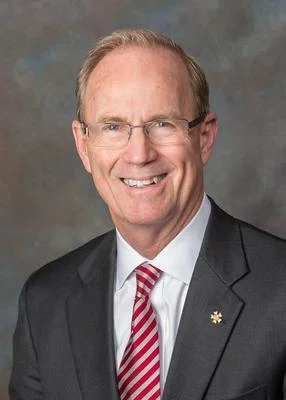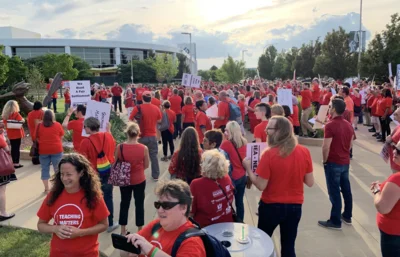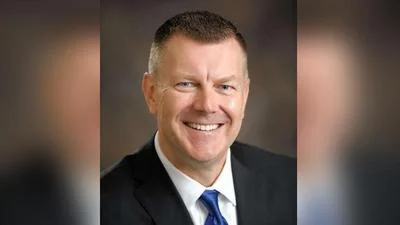Derke J. Price (left) told Laura Hois (right) that females must share locker rooms and bathrooms with biological men according to their “gender identity.” | Ancel Glink; Provided
Derke J. Price (left) told Laura Hois (right) that females must share locker rooms and bathrooms with biological men according to their “gender identity.” | Ancel Glink; Provided
The Downers Grove Park District is now allowing biological males to use women’s locker rooms and bathrooms, according to the District’s own attorney.
Derke J. Price, partner at Ancel Glink and legal counsel for the Park District, confirmed in an email to former DuPage County Board candidate Laura Hois that men identifying as women have full access to female facilities—igniting fierce debate over women’s privacy and safety.
“(T)he Department and the Commission have been emphatic about the need not to restrict or visit burdens upon those persons who identify differently than their gender at birth,” Price wrote.

Downers Grove Park District employees Ryan Mroz and Andy Anderson told Hois they must allow men to use women’s facilities.
| Downers Grove Park District
Price’s statement came in response to a letter from Hois dated May 31, 2025, in which she sounded the alarm over a disturbing encounter inside the women’s locker room—raising urgent questions about public safety and the Park District’s controversial policies.
Hois, a Downers Grove resident since 1985, confirmed the incident was documented in a police report and blasted the Park District for what she calls a blatant failure to protect women’s privacy rights.
“If teen girls and women remain permitted to fully undress in women's locker rooms, will teen boys and adult men who ‘identify’ as female be permitted to fully undress in women's locker rooms?” she said in the letter to the Downers Grove Park District. “Men are men, they are not women. ‘Transgenderism is the only mental illness demanding the rest of society adopt the patient's delusion as part of the patient's treatment.’”
Despite no official Board vote and vocal objections from patrons, Price emphasized the Park District’s unwavering enforcement of this controversial policy at the Cathy Mahoney Recreation Center and other District facilities.
“The goal of the District is for all patrons to have a great experience every time,” Price wrote. “Sometimes, however, there is friction among the various goals and values of the various users. The Park District, as a creature of Illinois law, must follow Illinois law in resolving such conflicts.”
Hois declined an interview request from the DuPage Policy Journal on the matter, noting a pending police investigation.
“DGPD apparently allows patrons to use the restroom or locker room that corresponds with their gender identity,” she wrote. “The ‘trans woman’ in the women's locker room was intruding on my space. He was permitted (under the guise of complying with IHRA) to violate my right of privacy by entering into or remaining in any restroom or locker room designated for the opposite sex.”
According to Hois, she was confronted with an unsettling moment the morning of March 22, when she says she was stunned to find a six-foot-tall man inside the women’s locker room—just moments after finishing a fitness class at the Cathy Mahoney Recreation Center.
“I was standing at my locker inside the women's locker room preparing to take a shower when I looked up and saw, to my left, a man opening the locker - three lockers away from me,” Hois said in a letter addressed to Erik Brown, Deputy Director of the Downers Grove Park District. “He had gray hair in a pony tail and was dressed in a gold-long-sleeved shirt and long black pants. I stepped back to see him more clearly and could tell he was not a woman: he was tall, had broad shoulders and slim hips.”
Hois described her emotional response and the actions she took after encountering the individual in the locker room.
She said she felt alarmed and unsure how to proceed.
“I was shocked and my heart was pounding. My mind was racing. He did not notice me. I thought, what am I supposed to do?” Hois wrote. “I had planned to take my clothes off to take a shower but now, with him right next to me, I could not do that. I waited. A minute or so later he turned and walked toward the toilets where he entered the handicap stall and closed the door. I gathered my belongings and exited the women's locker room to wait outside. The man stayed in the locker room for quite a while, around 15 minutes, before he came out and walked toward the step exercise machines.”
After leaving the locker room, Hois reported the incident to staff at the front desk.
“I went to the front desk, where Andy (Anderson), Ryan (Mroz) and a female staff member were working,” she wrote. “From there I identified the 6-foot man who was still walking between the machines and told them what had happened. They—all three of them—remained silent. They just looked at me.”
Hois said the encounter left her feeling violated and unsafe.
“If you think that encounter did not affect me, you would be mistaken,” she wrote. “It was creepy. It was threatening to my sense of well-being. It interfered with my right to use the locker room and take a shower. I was upset. I was angry. I was hesitant. I did not want to be there anymore.”
She reported seeing new signage added shortly after the incident but was uncertain if any policy change had occurred.
“Two weeks after the incident occurred, in early April 2025, I saw notices had been placed in plain view outside the men's and women's locker rooms prohibiting the taking of pictures or videos inside the locker rooms,” Hois wrote. “It appears these signs were put there in direct response to the man-in-womens'-locker-room incident I had reported to the front desk.”
Hois confronted staff about the policy, receiving a response that she found insufficient.
“In early April, while at the DGPD I approached the front desk where Andy and Ryan sat,” Hois wrote. “I asked, does the DGPD allow men in the women's locker room? After a too-long period of silence Ryan finally spoke up. He said, 'we are required to comply with the Illinois Human Rights Act.'"
Hois challenged this interpretation, citing an exemption under the Illinois Human Rights Act (IHRA) for distinctly private facilities.
She questioned the authority of the DGPD to enforce such policies without board approval.
“If the DGPD Board has not voted to permit the sexual integration of restrooms and locker rooms, by whose authority can the DGPD claim that patrons may use restrooms and locker rooms designated for persons of the opposite sex? Or, does the DGPD in fact claim this?” she wrote.
“The name of the person (or persons) who decided to sexually integrate restrooms and locker rooms in violation of the IHRA Exemption (if this has occurred) should be made public.”
Hois also raised concerns about the implications for women’s privacy and safety.
“Historically, girls and women have been permitted to be partially and fully undressed in women's locker rooms,” Hois wrote. “That's the purpose for locker rooms. Does the DGPD now consider it indiscreet for girls and women to be partially or fully undressed in their locker rooms?”
Hois questioned the broader implications of the policy, challenging whether women's privacy rights are being respected under the current approach.
“According to the DGPD, do girls and women have an intrinsic right to be free of the presence of biological males to whom they are unrelated?” she wrote. “If so, how can sexually integrating their private spaces be justified? What difference should it make to girls and women if the strange man in their locker room likes his sex or not, or chooses to identify as the opposite sex?”
Hois challenged the logic of maintaining gender-specific facilities if biological sex is no longer the guiding standard for access.
“If, on the other hand, girls and women have no such intrinsic right, why have any single sex shared private spaces? Why not make all locker rooms co-ed?” Hois wrote.
Hois called for the DGPD Board to consider the issue carefully and protect women’s rights.
“It violates women's rights to allow transgender persons access to their locker room,” Hois wrote. “In my opinion, it is profoundly wrong for a society to disregard both the meaning of sexed bodies and the safety of girls and women. I hope the DGPD Board will stand courageously for the truth.”
Hois expressed strong concerns about the implications for DGPD.
“To do otherwise will subject the DGPD to liability for failing to protect women and girls,” Hois wrote.
Hois reminded the board of their legal responsibilities and suggested that by allowing men to use facilities meant for females and vice versa the Park District’s federal funding could be at risk.
“The DGPD Commissioners should decide based on their obligation to abide by U.S. and Illinois Constitutions to serve all Downers Grove people, regardless of political party affiliation,” Hois wrote. “Note that federal grant money can/will be withheld from the DGPD if it violates Title IX.”
It is unclear how much of the Park District’s funding emanates from federal sources but it has acknowledged receiving federal grant funds in recent years.
The Downers Grove Park District is not the first organization to invoke the Illinois Human Rights Act in cases of biological men using women’s facilities.
In March, Nicole Georgas said her daughter and others felt violated after discovering a male student present while they were undressing for gym class at Deerfield Middle School.
Rather than addressing the girls’ concerns, Georgas said administrators Joanna Ford, Cathy Van Treese and Ginger Logemann reprimanded the girls and coerced them into changing in front of the male student.
Georgas has since filed a civil rights complaint with the U.S. Department of Justice.
In 2023, 16-year-old swimmer Abbigail Wheeler was removed from her Springfield YMCA team after expressing discomfort about sharing a women’s locker room with a biological male and was later accused of hate speech for posting signs opposing the policy.
“I’m glad I can be a voice for other young girls who may feel like we should just shut-up and not say anything about our feelings. Or if we feel uncomfortable, we just have to deal with it,” Wheeler, who is now an ambassador for the Riley Gaines Center, told WGN.






 Alerts Sign-up
Alerts Sign-up